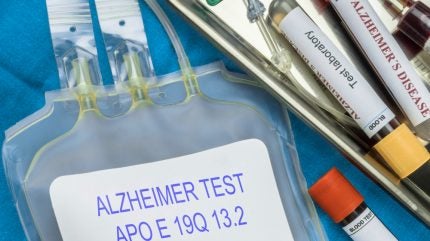
Pipeline blood-based biomarker tests could mean cheaper, faster, and more accessible diagnoses for Alzheimer’s disease patients, according to GlobalData analysis.
Speaking with Medical Device Network, Ashley Clarke, senior medical analyst at GlobalData, said: “Blood-based biomarker tests represent a major leap forward in diagnostics.

Discover B2B Marketing That Performs
Combine business intelligence and editorial excellence to reach engaged professionals across 36 leading media platforms.
“There has been a transformative shift in other conditions like heart attacks, where troponin tests are now widely used as a cost-effective, efficient path to early assessment. For Alzheimer’s disease, reliable and accessible testing could lead to earlier detection, giving patients more time to pursue interventions and lifestyle changes.”
As an Alzheimer’s diagnostic option, blood-based biomarker tests could be a simpler, more accessible alternative to PET scans and cerebrospinal fluid (CSF) analysis. They are yet to receive full approval by the FDA, but some devices are already showing good accuracy levels; for example, C2N Diagnostics’ PrecivityAD has demonstrated 90% accuracy in identifying Alzheimer’s disease in symptomatic patients.
According to research market is fertile, and GlobalData has identified 150 in vitro diagnostic tests for Alzheimer’s disease currently in development.
Five of these pipeline devices are currently in the regulatory approval process for the treatment of Alzheimer’s disease in the US and Europe. These include Medifron DBT’s Next Generation diagnostic test, and Roche Diagnostics International’s Elecsys tTau/Abeta42 assay, designed to detect the presence of tTau and AB42 biomarkers in blood.

US Tariffs are shifting - will you react or anticipate?
Don’t let policy changes catch you off guard. Stay proactive with real-time data and expert analysis.
By GlobalDataNot as far along in the production process, Roche’s Elecsys amyloid plasma panel recently showed a negative predictive value of 96.2% in Phase II trials. These results suggest a strong potential to rule out Alzheimer’s disease.
Clarke commented that, “With high negative predictive values, blood-based tests could serve as reliable screening tools, helping reserve hospital resources for procedures such as PET scans for patients most likely to need them.”
Alzheimer’s disease is currently thought to affect over 55 million people across the world, and forecasts suggest that cases could triple by 2050; advances in diagnostic methods will be an essential puzzle piece for effective disease management.
Clarke concluded: “Blood-based tests for Alzheimer’s have the potential to transform how we diagnose this disease, making it easier and less invasive for patients. By ensuring these tests are accurate and ethically implemented, we can enhance early detection, reduce healthcare costs, and ultimately improve outcomes for families navigating the challenges of Alzheimer’s disease.”





